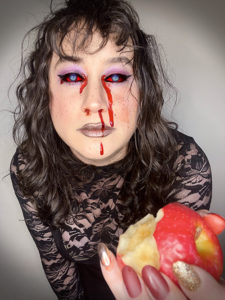Eve Harms is a writer of freaky, fun, dark fiction who currently resides in Los Angeles with her children’s book illustrator wife and two cats. Her work has appeared in publications such as Vastarien Literary Journal, under Rayna Waxhead, and Creepy Catalog, under Kendra Temples. Her forthcoming transsexual body horror novella Transmuted is coming out July 15th, 2021 as a part of Unnerving’s Rewind or Die series. She blogs regularly about occult and esoteric topics on her website at https://eveharms.com
What inspired you to start writing?
I’ve dabbled in just about every artistic medium you can think of throughout the years and majored in abstract painting and performance art. After college, I became very active in the Net Art scene, and was having some success, but I didn’t feel like it was fulfilling. People would look at my art and think it was funny or weird or cool, but then never think of it again. I was drawn to storytelling because it’s the most powerful and lasting way of communicating ideas and opening people up to different perspectives.
What was it about the horror genre that drew you to it?
I’ve had a love for horror since my childhood in the 90s when my older brother would bring home VHS tapes of bizarre films from the video rental store he worked at. As a genre, I believe horror has the most freedom to get wild and weird and express all aspects of the human experience.
In terms of my own writing, I wasn’t really committed to horror until I read The Secret of Ventriloquism by Jon Padgett. I read it shortly after witnessing the unexpected death of my younger brother, and the book literally put me into an altered state of surreal dread. But it was a surreal dread distinct from the one I was living with at that time, and it was profoundly healing. Since then I’ve been hooked, and hope my work can help others through difficult times as well.
Do you make a conscious effort to include LGBTQ material in your writing and if so, what do you want to portray?
After coming out, including themes and characters that reflect my experience as a transgender person and a queer person has been very important. Transmuted is my first book to explicitly include these themes and characters, as I began writing my previous series while still in the closet.
There’s a push to portray LGBT characters, especially transgender ones, in a positive light in the name of “good representation”, but I’m not interested in that. I believe we deserve characters that are human, and humans have flaws—sometimes big ones. I believe we deserve queer characters that go through trauma, even in the face of the real life horrors that LGBT people face.
What has writing horror taught you about the world and yourself?
I think I’m too early in my career to properly answer this question, to be honest. I have learned that people turn to the genre for many different reasons, and everyone experiences it differently.
How have you seen the horror genre change over the years? And how do you think it will continue to evolve?
I’ve seen the genre become more inclusive and diverse, many new small presses popping up, and more writers self publishing and choosing themselves. I think this trend will continue, and horror will flourish and grow even more.
How do you feel the LGBTQ community has been represented thus far in the genre and what hopes do you have for representation in the genre going forward?
Queerness has largely been subtext in horror when done right, and harmfully exploitive when done wrong. I’m hoping for more explicitly queer characters, making the subtext text, and having less harmful stereotypes and two-dimensional characters. There really is very little representation in the mainstream.
Who are some of your favorite LGBTQ characters in horror?
I’m fond of both Gyre and Em in The Luminous Dead by Caitlin Starling, and Kelly in Dreadnought by Gretchen Felker-Martin. I wish there were more queer characters. If you search online for LGBT characters in horror films you get lists of less than 10 that always seem to include The Babadook who is not canonically queer. Which is funny, I guess, but telling.
Who are some LGBTQ horror authors you recommend our audience check out?
href=”https://www.goodreads.com/author/show/17232742.Gretchen_Felker_Martin” target=”new”>Gretchen Felker-Martin, Hailey Piper, Caitlin Starling.
What is one piece of advice you would give horror authors today?
Don’t be afraid to choose yourself. We have all of the tools at our disposal to get our work into the world and no longer have to depend on gatekeepers to build our audience. If you have something important to share that no publisher will accept, don’t give up on it, publish it yourself. We have the power to shape culture and build our own power structures, let’s use it!
And to the LGBTQ writers out there who are just getting started, what advice would you give them?
Be brave and tell the story you want to tell. Don’t pull punches on the queerness in your work. Don’t sanitize it, include that explicit deviant sex scene that will freak out the normies. The work you are most scared to share is your most important work.


